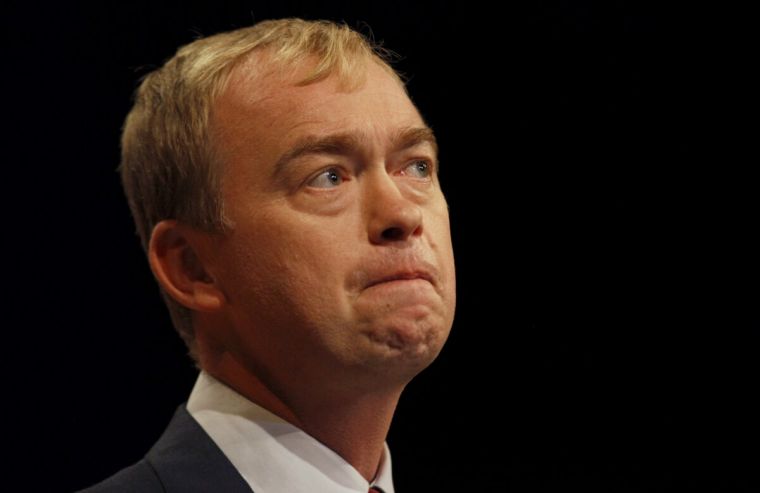Farron's fall – neither liberal nor democratic

After being exposed to an insufferable media campaign about his faith, the leader of the Liberal Democrats, Tim Farron, found himself 'torn between living as a faithful Christian and serving as a political leader' and so he resigned. And who could blame him? Politics has always been a tough business and general elections have always been rough rides. Tim was surely prepared for that. What he wasn't prepared for, and what nobody really expected, was a vicious and sustained assault on his faith. And he wasn't alone in this.
During the election, various Christian candidates where targeted with some pretty unsavoury media attention, political criticism and activist protests. Their crime? They are Christians. Or more precisely traditional, mainstream, theologically orthodox, practising Christians. No more. No less. Just Christians. With the same motivations for public service as figures such as Hannah More, William Wilberforce, Shaftesbury, Gladstone, Kier Hardie and even Gordon Brown. So what's changed? Why are candidates with faith now being subjected to such scrutiny?
The issue, for some, it seems is the traditional Christian view on marriage and sexual ethics. To clarify, what these candidates believe is no different from what the vast majority of people who self-identify as Christians have historically believed and no different to what many Christians believe today across the world in increasing numbers. Their convictions, deriving as they do from mainstream, historic Christian views about sexual ethics are not only consistent with biblical teaching, they are, extraordinarily consistent across Protestantism, Roman Catholicism and expressions of Greek and Russian Orthodoxy. So, even accounting for religious illiteracy, what on earth do people expect Christians and for that matter, those of the other Abrahamic faiths to believe?
There's no doubt that historically Christianity has much to repent of with regard to the treatment of gay people, and repent it does. Yet, however committed Christian public figures are to seeing a plural public square, a truly civil society, and a common good, it seems that, for some it can never be enough.
Notwithstanding Tim Farron's rather untenable line that 'my faith is private', it was notable that he had tried with patience to prove his liberal credentials. Including eventually responding to persistent questions around gay sex with a response he hoped and thought would answer his critics. But to no avail. Perhaps, most importantly it's also worth reflecting on the fact that, more than what he espoused or how he had voted, he was pursued for what he believes, what he thinks. Other candidates sought to be open about their faith, and to express and explain their beliefs in a equally gracious and democratic spirit. But again to no avail.
With the hung parliament the spotlight turned on the Democratic Unionist Party. Vilified by the so-called liberal media because of the views of MPs on issues such as abortion and the redefinition of marriage, the coverage has been justified on the basis that such views are so 'extreme' and intolerant that they should not be tolerated. Akin to a form of societal gas-lighting, this is about presenting assumptions and opinions as facts, as 'givens'.
All of which makes this general election different from all the others that went before. Different because of the coronation of a new ideology, the proponents of which take every opportunity to infer the normality of their views by challenging, delegitimising and ultimately silencing any dissenting views and voices. Let's call it 'sextremism'. With its roots on the campuses of universities which have facilitated the growth of identity politics, it has a focus on gay rights, radical feminism, intersectionality and gender-fluidity. The language here is about hate speech and offence, and involves virtue signalling, trigger-warnings, no-platforming, micro-aggressions and the provision of safe-spaces to exclude individuals who might hold 'unsafe' or different views – whether this is Peter Tatchell, Germaine Greer or Melanie Phillips. Unchecked, this loud and occasionally violent ideology propagates a particular view of history, reality and human nature that skews intellectual enquiry, erodes diversity and stifles debate. The effect of which is that, in the words of WB Yeats: "The best lack all conviction, while the worst are full of passionate intensity.'
The blood sport of hunting down Tim Farron is where this leads. In the end, Tim chose to put his hope in Jesus Christ, because in the end that's what really matters. Yet when the leader of the Liberal Democrat Party says that 'to live as a committed Christian, to hold faithfully to the Bible's teaching, has felt impossible for me' it suggests that contemporary liberalism is no longer liberal. It also suggests that this new authoritarian ideology is no respecter of plural society and democracy – to which Christianity has contributed so very much. Which raises an important question: after centuries of shaping politics and government, are Christian beliefs now unacceptable in public life?
If the answer is 'no', then it is beholden on all who value liberal democracy to stand up to this new ideology. If the answer is 'yes', then things will need to change.
We should not expect our politics and society to enjoy the fruits of Christianity without the roots. In this case, we should drop the pretence of calling ourselves a liberal democracy and simply legislate against Christians in public life. That's at least a more honest approach. Because as Tim Farron conceded, 'we are kidding ourselves if we think we yet live in a tolerant, liberal society'.
Dr David Landrum is director of advocacy at the Evangelical Alliance.











